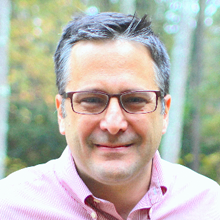 Facundo Fernandez, Ph.D.
Facundo Fernandez, Ph.D.
Professor, School of Chemistry and Biochemistry
Georgia Tech
Triboelectric Mass Spectrometry to Unravel Complex Prebiotic Mixtures
Research
Mass Spectrometry (MS) is one of the key analytical methods used to identify and characterize small quantities of biological molecules embedded in complex matrices. Although MS has found widespread use, improvements are still needed to extend its application to the grand challenges of this century. Since starting my position at Georgia Tech in 2004, my group members and I have used an integrated strategy with roots in bioanalytical chemistry, instrumentation development, bioinformatics, and theoretical modeling to focus on questions of great societal and scientific significance. To this purpose, we have integrated with cross-cutting teams devoted to problems that range from explaining the origins of life on Earth and diagnosing cancer at an early stage, to tracking the sources and prevalence of counterfeit pharmaceuticals worldwide. The common theme along these questions is the need for highly accurate tools for quantifying, identifying, and imaging trace chemicals in complex mixtures.
Research in our lab uses state-of-the-art mass spectrometry, ion mobility gas-phase separations, ultrahigh performance liquid chromatography, and new soft ion generation techniques. We investigate the obtained data using machine learning and other powerful bioinformatic approaches. Our group is very dynamic, and each student pursues more than one project at a time, usually in collaboration with other group members or with other research groups at GT or elsewhere. Graduate and undergraduate students are trained in a variety of bioanalytical instrumentation/methodologies, with an emphasis on the fundamentals. We are analytical mass spectrometrists at heart, and strive to answer "big" scientific questions or questions with a large societal impact.
Abstract
Marcos Bouza 1,2, Anyin Li 1,2, Danning Huang 1,2, Yafeng Li 1, Yunlong Zi 3, Changsheng Wu 3, Hengyu Guo 3, Zhong Lin Wang 3,4, and Facundo M. Fernández 1,2
1. NSF/NASA Center for Chemical Evolution
2. School of Chemistry and Biochemistry, Georgia Institute of Technology, Atlanta, GA 30332, USA.
3. School of Materials Science and Engineering, Georgia Institute of Technology, Atlanta, GA 30332, USA.
4. Beijing Institute of Nanoenergy and Nanosystems, Chinese Academy of Sciences, National Center for Nanoscience and Technology (NCNST), Beijing 100083, China.
Understanding complex chemical and biological systems requires detailed knowledge of their molecular composition. Mass spectrometry (MS) is the tool of choice for probing such complex systems when femto- to attomole sensitivity is required with simultaneous exquisite specificity. Origins-of-life chemistry is one field where incredibly complex mixtures are generated, an example being polymer or lipid libraries produced by dry-down reactions. Regardless of the type of mixture being studied, efficient generation of gas-phase ions by electrospray ionization is critical in all MS experiments to yield the highest sensitivity with the minimum ion suppression. Through work in the Center for Chemical Evolution, we have proposed triboelectric nanogenerators (TENGs) as alternative power sources for nanoelectrospray ionization (nanoESI). The electric pulse created during TENG nanoESI has the capacity to deliver discrete amounts of charge to ionize analytes with excellent sensitivity, reproducibility, and minimum sample usage. The generated charges are directly related with TENG materials and electrode sizes, so larger TENGs boost the number of charges and the associated voltage. Although high voltages are generally avoided during DC nanoESI to avoid corona discharge formation, the pulsed nature of TENG overcomes the detrimental effects of such discharges, leveraging them for the generation of gas-phase reagent ions. In this presentation, we describe progress in TENG MS technology achieved during the CCE years, the various platforms developed for increased chemical coverage, the application to protopeptide libraries and lipid structural elucidation, and how TENG MS technology derived from CCE work can also be leveraged for biomedical applications.




